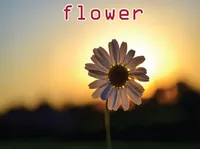
English vocabulary and phrases on Mid-Autumn Festival
flower means . Learn how to pronounce and use flower through vivid examples and easy-to-understand exercises.

Okay, let's break down how to pronounce "flower" in English. It's often tricky for non-native speakers! Here's a breakdown:
The most common and accepted pronunciation is:
Let's break it down syllable by syllable:
"fl" - Sounds like the "fl" in "flat" – a short, quick "fl" sound. Think of it as a single, crisp "fl."
"ow" - This is the tricky part! It sounds like the "ow" in "cow" or "now." It’s a long "o" sound. It's crucial to make this sound distinct from the "oh" in "bone" or “go”.
"er" - This is a soft, short "er" sound, similar to the "er" in "her" but often slightly more subtle.
Putting it together, you get: “flaw-er” (stress on the first syllable)
American English Pronunciation:
American English often simplifies it slightly:
Tips for getting it right:
Resources:
Would you like me to:
Let's break down how to use the word "flower" in English. It's a surprisingly versatile word with several different meanings! Here's a breakdown, categorized with examples:
Tips for Using "Flower" Correctly:
Resources for Further Learning:
To help me give you even more targeted information, could you tell me:
In horticulture, what is the term for the part of a plant that is often colorful and contains the reproductive organs? a) Root b) Stem c) Flower d) Leaf
Which of these items would typically be included in a bouquet for a formal ceremony? a) Flowers b) Weeds c) Rocks d) Ribbons e) Foliage
A botanist might specialize in studying the morphology of a specific ______. a) flower b) insect c) molecule d) galaxy
Which term best describes a group of flowers on a single stem, such as in a sunflower or daisy? a) Inflorescence b) Corm c) Tuber d) Rhizome
The park's famous cherry trees are expected to be in full ______ next week, attracting numerous tourists. a) foliage b) bloom c) sprout d) decay
Original: The botanist conducted a detailed study on the plant's reproductive bloom. Rewrite using "flower": The botanist conducted a detailed study on the plant's reproductive ______.
Original: The annual plant begins to bloom extensively in early summer. Rewrite using a related word form of "flower": The annual plant begins its intensive ______ in early summer.
Original: The bright colors of the spring flowers always lift my spirits. Rewrite without using "flower": The bright colors of the spring ______ always lift my spirits.
Exercise 1: Fill in the blanks
Exercise 2: Choose the correct answer
Exercise 3: Rewrite the sentences

English vocabulary and phrases on Mid-Autumn Festival

Tips to improve vocabulary in communication

English vocabulary by topic: Clothes

The secret to remembering all 50 English vocabulary words every day easily

English vocabulary by topic: Human body

Vocabulary of the most popular subjects in English

Learn English about Covid: All about vocabulary and disease prevention

Vocabulary of Subjects in English

Set of 60 English vocabulary on educational topics

Vocabulary - just a small thing!
Comment ()